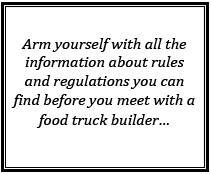Investing in a food truck represents the single largest startup expense for the mobile chef. Cutting corners might seem financially expedient to getting your business on the road, but undercapitalizing your physical premises potentially leads to frequent downtime, costly repairs, and even loss of permits and licenses, all threatening to topple your culinary empire dreams before the rubber hits the road. Investing in building a quality truck that meets code and statute regulations gives you a better chance to achieve success and avoid downtime or total shutdown.
Know the Rules and Regulations of Truck Construction & Facilities
Trusting any business or person to know the rules and regulations for food truck construction sets you up for a disappointment. Arm yourself with all the information about rules and regulations you can find before you meet with a food truck builder so you can identify whether or not the builder knows his trade or just knows the tricks of the trade. Also understand the quality of appliances, hardware, pipes, wiring, fire suppression, and fittings so you can not only stay on budget, but avoid letting the builder talk you into something of lesser quality than you need or want because it makes him more money by taking advantage of your ignorance.
According to the state code and some local regulations, all food trucks must include:
- Enclosures, screens, or fans
- Potable water
- Hand washing sink
- Sanitation sink and drain boards
- Ability to control air, water, and food temperatures to meet health code requirments
- Mechanical refrigeration for foods that must be kept cold
- Mechanical ventilation
- Fire suppression systems
- Waste disposal systems
- Power source
- Countertop/prep space
Understand that many of these items must meet certain minimum standards and that each municipality may require something superior or supplemental to the state requirements.
Each truck must also account for:
- Cleaning facilities
- Maintenance of equipment
- Waste disposal
- Storage
- Toilet facilities
Also, your truck must use a commissary kitchen to which it must return each day. The commissary kitchen must also meet certain physical standards and supply the truck with certain items. For example, among other items, the commissary kitchen must come equipped with:
- Potable water
- Cooking equipment
- Mop sink
- Restrooms
- 3-compartment sink for washing
- Garbage disposal
- Food preparation sinks
- Back up refrigeration
Know Some Basic Physics and Get a Plan with Schematics
Knowing a little bit about physics helps too. For example, Acebedo & Johnson, LLC once represented a food truck client for whom the truck builder failed to accurately determine the effect of the weight of the water in the clean water tank. As a result, when full, the weight and position of the tank scraped on the street when negotiating steep hills and driveways. Ask to see written plans and schematics that include calculations for liquid and food weight and the effect they impose on the vehicle’s performance, particularly on hilly city streets like those of Seattle and Tacoma.
Due Diligence, A Written Contract, and Attorney Assistance
Finally, not only should you conduct your own due diligence on a builder by investigating their bonds and licenses, but never enter into an agreement without getting it in writing and asking an attorney to review the contract before you pay the builder. It may seem like a financial burden at the time, but paying an attorney saves you money in the long run by giving you an objective review of the contract to help you dodge unscrupulous, incompetent or unreliable builders.
 With the food truck business starting to blossom in places like Tacoma and Seattle, a number of local new companies offer modifications to food trucks. However, because the results may not meet your needs, exercise an abundance of caution before simply accepting the lowest bid. Consult with fellow food truck operators, seek out blog articles or online ratings, or even check the Better Business Bureau regarding any company before engaging their services.
With the food truck business starting to blossom in places like Tacoma and Seattle, a number of local new companies offer modifications to food trucks. However, because the results may not meet your needs, exercise an abundance of caution before simply accepting the lowest bid. Consult with fellow food truck operators, seek out blog articles or online ratings, or even check the Better Business Bureau regarding any company before engaging their services.
Most importantly, seeking a review of the contract by an attorney helps ensure the builder you want to engage warrants their work product and delivers a drivable vehicle that complies with the Department of Labor & Industry. Your desire and sense of urgency to get to work and prove yourself may compromise your objectivity. A lack of legal education and training makes it inadvisable to trust your own knowledge and experience to satisfactorily scrutinize any contract for loopholes and omissions. Particularly important sections to review include those detailing warranty exclusions and limitations on liability and all other critical legal clauses. Worse yet, not knowing what clauses the contract omits that might protect you in a dispute can turn your dreams of perfectly seared ahi into nightmare of charred shark.
Local Rules
Each municipality may make further requirements of your food truck. Check out the following links to get started with your research.
- King County:
http://www.kingcounty.gov/healthservices/health/ehs/foodsafety/FoodBusiness/mobile.aspx
- Pierce County:
http://www.tpchd.org/food/opening-food-business/
More Food Truck Articles Coming Your Way Soon…
